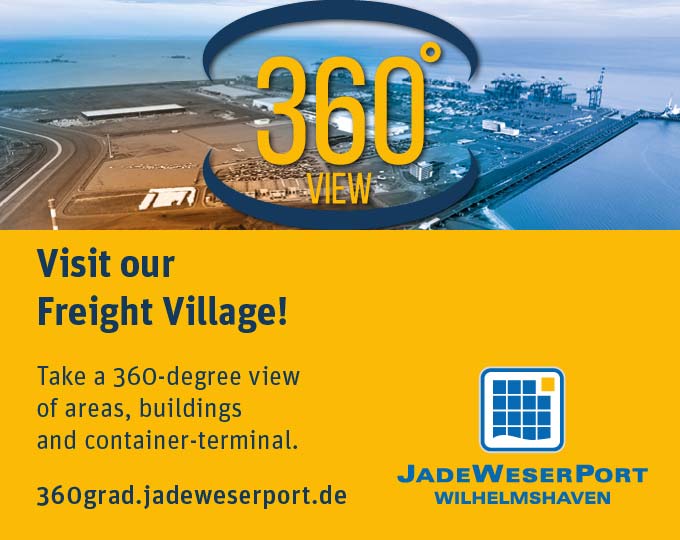To what extent are our ports implementing a cooperation concept? Professor Frank Ordemann and Professor Jan Ninnemann give their opinions on this.
Ordemann:
From my perspective, this is the only true solution.Ninnemann: In the container segment, closer cooper-ation between the ports of Hamburg, Bremen/Bremer-haven and Wilhelmshaven is only part of the solution. Hamburg and Bremerhaven, in particular, face a wide range of challenges, which the terminal operators have to address independently first of all. This includes handling costs, which are significantly higher with simultaneously lower productivity compared to competitors in Rotterdam and Antwerp.
LOGISTICS PILOT: LOGISTICS PILOT: In what areas is the cooperation concept clearly evident to you, and what measures do you think would need to be stepped up in the coming months in order to further intensify this cooperation?
Ordemann: Port cooperation, as I understand it, is an operational collaboration between the container terminals of our three major container ports; this is something that is not yet evident to me at all. To my knowledge, talks initiated in 2020 between the terminal companies and the relevant politicians, who became involved later, are on hold. The first step towards such cooperation is recognition by the decision-makers involved that all three ports would benefit from this. What’s more, that each individual port will gain greater market share in competition with the western ports proceeding this way than if they were to continue “business as usual”. This is the most important realisation that those responsible for ports need to come to first and foremost. I have my doubts as to whether this is the case for everyone as it stands. Moving on from there, everything can be implemented in line with the seven steps I outlined in my 2020 study on this subject, or via other means. But those are the specifics.
Ninnemann: The cooperation concept is primarily developing in alternative cargo segments outside container transport. German seaports are rightly regarded as the engine of energy transition. In order to meet the challenges that this entails as best possible, it is necessary to employ all resources at all German ports in close cooperation. This applies, amongst other things, to the import of green energy – for example, hydrogen or hydrogen derivatives such as ammonia – or to the creation of capacities to achieve the expansion targets for offshore wind energy.

“Port cooperation, as I understand it, […]
is not yet evident at all.”
Prof. Frank Ordemann, Head of the Institute for Logistics Management at Ostfalia University of Applied Sciences in Salzgitter. In 2020, he wrote a study on seaport cooperation between North German ports entitled “German ports miss competitive opportunities”.

“There is a lack of planning capacity and a robust legal framework to implement projects quickly.”
Prof. Jan Ninnemann, Professor of Business Administration and Academic Head of BSc Logistics Management at Hamburg School of Business Administration (HSBA)
Ordemann:
Such port cooperation can only succeed if policy and business cooperate wholeheartedly and work as a unit. As far as the two major players, HHLA and the BLG Group, are concerned, the federal states have the lion’s share in these companies. With their majorities on the supervisory boards, they are required to represent their respective interests regarding port cooperation and to monitor these. Of course, the boards of directors of these two companies are also paramount. The state of Lower Saxony is also involved in this process as co-owner of JadeWeserPort. The extent to which other co-owners of individual terminals will be required is a question of how this cooperation is structured.Ninnemann: Nowadays, strategic development and the expansion of ports are mostly matters of the state. Coastal states such as Hamburg, Bremen and Lower Saxony face the challenge of having to finance the necessary investments in the maintenance and expansion of the ports more or less on their own. The funds available for this purpose are often not sufficient to support the Federal Government’s plans, which can be quite ambitious, for example when it comes to energy transition. Similarly, there is a lack of planning capacity and a robust legal framework to implement projects quickly. The ports depend on support from Berlin in this regard.
LOGISTICS PILOT: In many of our neighbouring countries, port cooperation has long been a reality. Are we late on this development in Germany?
Ordemann: My guess is that the decision-makers in Hamburg, in particular, are struggling with the idea that they would benefit from a port cooperation. I think there are quite a few people who believe that the strategy to deepen the Elbe will give them an advantage in order to stay ahead of their German competitors in the market. But this is a misconception, just like it is a general misconception that long-term opportunities can be gained for individual ports by deepening the Elbe and the Outer Weser. These measures just won’t cut it. They are just a drop in the ocean, which will allow a little more cargo handling for them. It does not make any difference to the basic structures, namely that they are still unable to allow large container ships with full loads to enter or leave the ports of Bremerhaven and Hamburg. This is only possible in coordination with the JadeWeserPort. I think that Hamburg would benefit the most from port cooperation in terms of volume, JadeWeserPort would benefit the most in relative terms and Bremerhaven would be somewhere in between. So yes, Germany is still late on this development to this day. Tackling this issue should have been started with force back in 2014.
Ninnemann: In comparison to Belgium and the Netherlands, the answer is most definitely yes. Successful port cooperation often takes place at the level of public port administrations in particular. Close cooperation has enabled our neighbours to achieve a wide range of synergies, for example by sharing equipment or marketing across different ports. This can also increase awareness at national and international level. A fundamental requirement for successful cooperation is the ability to share opportunities to influence port development. Germany is often too location-focussed. (bre)
Logistics Pilot
The current print edition - request it now free of charge.







